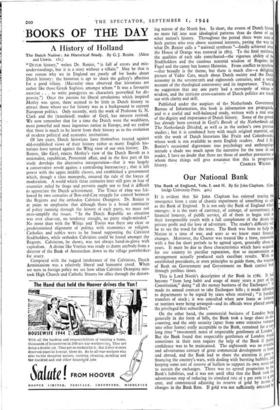BOOKS OF THE DAY
A History of Holland
"DUTCH history," write§ Dr. Renier, "is full of errors and mis- understandings, but it is a story without a villain." May be that is one reason why we in England are poorly off for books about Dutch history : the historian is apt to share the gallery's affection for a good villain. (Macaulay once observed that historians are rather like those Greek Sophists amongst whom. " It was a favourite exercise . . . to write panegyrics on characters proverbial for de- pravity.") Once the passion for liberal revolutions which inspired Motley was spent, there seemed to be little in Dutch history to attract those whose use for history was as a background to current European politics. Only recently, with the work of Professor G. N. Clark and the (translated) studies of Geyl, has interest revived. We now remember that for a time the Dutch were the wealthiest, most powerful and most ingenious nation in Europe, and we realise that there is much to be learnt from their history as to the evolution of modern political and economic institutions. Of late years, Dutch historians have themselves reacted against old-established views of their history rather as many English his- torians have turned against the Whig view of our own history. Dr. Renier, like Geyl, rejects Motley's view of the Dutch Revolt as a nationalist, republican, Protestant affair, and in the first part of his study develops the alternative interpretation—that it was largely a conservative revolt against a centralising bureaucracy ; that it left power with the upper middle classes, and established a government which, though a class monopoly, ensured the rule of the forces of moderation. A world which three centuries later still goes in fear of countries ruled by thugs and perverts ought not to find it difficult to appreciate the Dutch achievement. The Truce of 1609 was fol- lowed by two centuries of Box-and-Cox struggle for control between the Regents and the orthodox Calvinist Orangists. Dr. Renier is at pains to emphasise that although there is a broad continuity of policy running through the history of each party, we must not over-simplify the issues. " In the Dutch Republic no situation was ever clear-cut, no tendency straight, no party single-minded." No more than with the Whigs and Tories was there any clear or , predetermined alignment of politics with economics or religion. Catholics and nobles were to be found supporting the Calvinist Stadtholders, while orthodox Calvinists could be found amongst the Regents. ealvinism, he shows, was not always hand-in-glove with capitalism. A divine like Voetius was ready to damn anybody from a director of the Bank of Amsterdam down to the village pawnbroker. for usury.
Compared with the rugged intolerance of the Calvinists, Dutch 4rminianism was a relatively liberal and humanist creed. When we turn to foreign policy we see how often Calvinist Orangists mis- took High Church, and Catholic Stuarts for allies through the distort- ing mirror of the North Sea. In short, the events of Dutch history no more fall into neat ideological patterns than do those of my other nation's history. Throughout the period there were men both parties who rose above sectional interests, paving the way fir what Dr. ,Renier calls a " national synthesis "—finally achieved whet the House of Orange was restored in 1815. To the final synthesis, the qualities of each side contributed—the vigorous ability of the Stadtholders and the cautious material wisdom of Regents hit Fagel and the canny but honest Heinsius. From conflict to synthesis —that broadly is the theme, but there is much else—a delightful picture of Vader Cats, much about Dutch society and the Dutch economy in the seventeenth and eighteenth centuries, and a useful account of the theological controversy and its importance. There no suggestion that any one party had a monopoly of virtue or wisdom, and the intricate cross-currents of Dutch politics are traced out with clarity and skill.
Published under the auspices of the Netherlands Government Bureau of Information, this book is information not propaganda, and is a useful and well-balanced study, written with a real sense of the dignity and importance of Dutch history. Some of the ground has already been covered in Geyl's Revolt of the Netherlands and The Netherlands Divided, as well as in the author's own previous studies ; but it is combined here with much original material, and with the work of Dutch historians like Fruin and Colenbrander, whose work is not available to most English readers. And if Dr. Renier's occasional digressions into psychology and anthropology intrude a shade too much upon the narrative for the taste of one reader, I have no doubt that there are those of another persuasion to whom these things will give assurance that this is progressive


























 Previous page
Previous page